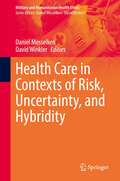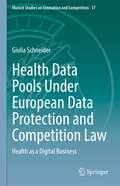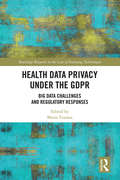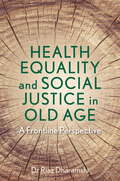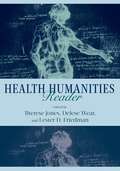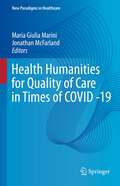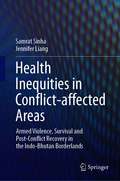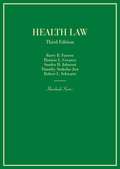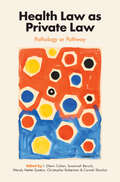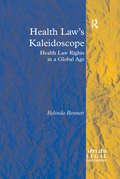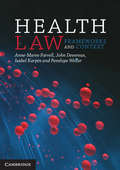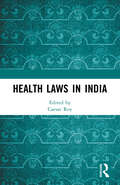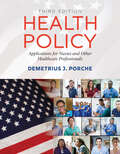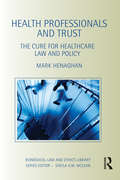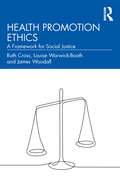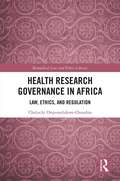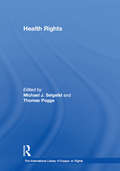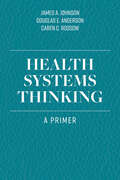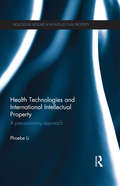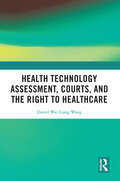- Table View
- List View
Health Care and EU Law
by Erika Szyszczak Markus Krajewski Johan Willem Gronden Ulla NeergaardThe aim of the present volume is to explore the consequences of the impact of the EU rules for the internal market (including the proposed Directive on patients' rights) and competition on national health care systems. It will also address how related areas, such as EU public procurement law and WTO law, influence national healthcare organisation and Member State autonomy.
Health Care and EU Law (Legal Issues of Services of General Interest)
by Erika Szyszczak Markus Krajewski Ulla Neergaard Johan Willem van de GrondenThe EU has only limited competence to regulate national health-care systems but recent developments have shown that health care is not immune from the effects of EU law. As Member States have increasingly experimented with new forms of funding and the delivery of health-care and social welfare services, health-care issues have not escaped scrutiny from the EU internal market and from competition and procurement rules. The market-oriented EU rules now affect these national experiments as patients and health-care providers turn to EU law to assert certain rights. The recent debates on the (draft) Directive on Patients’ Rights further underline the importance, but also the difficulty (and controversy), of allowing EU law to regulate health care.The topicality of the range of issues related to health care and EU law was addressed, in October 2009, at a conference held in Nijmegen, The Netherlands. The present volume contains inter alia the proceedings of this conference and invited essays. This volume follows the publication of The Changing Legal Framework for Services of General Interest in Europe. Between Competition and Solidarity (Krajewski M et al (eds) (2009) T.M.C. Asser Press, The Hague) and launches a new series: Legal Issues of Services of General Interest. The aim of the series is to sketch the framework for services of general interest in the EU and to explore the issues raised by developments related to these services.The book is compulsory reading for everyone who is engaged in issues relating to health care and EU law.Johan van de Gronden is Professor of European Law at the Law Faculty of the Radboud University Nijmegen, the Netherlands. Erika Szyszczak is a Jean Monnet Professor of European Law ad personam and Professor of European Competition and Labour Law at the University of Leicester, UK. Ulla Neergaard is Professor of EU law at the Law Faculty of the University of Copenhagen, Denmark. Markus Krajewski is Professor of International Public Law, Faculty of Law, University of Erlangen-Nuremberg, Germany.
Health Care in Contexts of Risk, Uncertainty, and Hybridity (Military and Humanitarian Health Ethics)
by Daniel Messelken David WinklerThis book sheds light on various ethical challenges military and humanitarian health care personnel (HCP) face while working in adverse conditions. Contexts of armed conflict, hybrid wars or other forms of violence short of war, as well as natural disasters, all have in common that ordinary circumstances can no longer be taken for granted. Hence, the provision of health care has to adapt, for example, to a different level of risk, to scarce resources, or uncommon approaches due to external incentives or requirements. This affects the practice of health care as well as its ethics. This book offers a panoramic overview on various challenges healthcare faces in extraordinary situations and provides new insights from practitioners’ as well as from academic scholars’ perspectives.
Health Data Pools Under European Data Protection and Competition Law: Health as a Digital Business (Munich Studies on Innovation and Competition #17)
by Giulia SchneiderThis book explores the emerging economic reality of health data pools from the perspective of European Union policy and law. The contractual sharing of health data for research purposes is giving rise to a free movement of research data, which is strongly encouraged at European policy level within the Digital Single Market Strategy. However, it has also a strong impact on data subjects' fundamental right to data protection and smaller businesses and research entities ability to carry out research and compete in innovation markets. Accordingly the work questions under which conditions health data sharing is lawful under European data protection and competition law. For these purposes, the work addresses the following sub-questions: i) which is the emerging innovation paradigm in digital health research?; ii) how are health data pools addressed at European policy level?; iii) do European data protection and competition law promote health data-driven innovation objectives, and how?; iv) which are the limits posed by the two frameworks to the free pooling of health data? The underlying assumption of the work is that both branches of European Union law are key regulatory tools for the creation of a common European health data space as envisaged in the Commissions 2020 European strategy for data. It thus demonstrates that both European data protection law, as defined under the General Data Protection Regulation, and European competition law and policy set research enabling regimes regarding health data, provided specific normative conditions are met. From a further perspective, both regulatory frameworks place external limits to the freedom to share (or not share) research valuable data.
Health Data Privacy under the GDPR: Big Data Challenges and Regulatory Responses (Routledge Research in the Law of Emerging Technologies)
by Maria TzanouThe growth of data-collecting goods and services, such as ehealth and mhealth apps, smart watches, mobile fitness and dieting apps, electronic skin and ingestible tech, combined with recent technological developments such as increased capacity of data storage, artificial intelligence and smart algorithms, has spawned a big data revolution that has reshaped how we understand and approach health data. Recently the COVID-19 pandemic has foregrounded a variety of data privacy issues. The collection, storage, sharing and analysis of health- related data raises major legal and ethical questions relating to privacy, data protection, profiling, discrimination, surveillance, personal autonomy and dignity. This book examines health privacy questions in light of the General Data Protection Regulation (GDPR) and the general data privacy legal framework of the European Union (EU). The GDPR is a complex and evolving body of law that aims to deal with several technological and societal health data privacy problems, while safeguarding public health interests and addressing its internal gaps and uncertainties. The book answers a diverse range of questions including: What role can the GDPR play in regulating health surveillance and big (health) data analytics? Can it catch up with internet-age developments? Are the solutions to the challenges posed by big health data to be found in the law? Does the GDPR provide adequate tools and mechanisms to ensure public health objectives and the effective protection of privacy? How does the GDPR deal with data that concern children’s health and academic research? By analysing a number of diverse questions concerning big health data under the GDPR from various perspectives, this book will appeal to those interested in privacy, data protection, big data, health sciences, information technology, the GDPR, EU and human rights law.
Health Equality and Social Justice in Old Age: A Frontline Perspective
by Dr Riaz Dharamshi"The first lesson is that success looks like whatever your patient describes it as ... Some want to be pain free, to breathe a little easier, to make it to their grand-daughter's wedding ... to be with their cats. Some want me to do everything I can to cure them, while others want to die soon."Geriatric care and the frailty of old age can sometimes be reduced to a pain score chart rather than an inevitability that needs to be approached with humanity and empathy. Dr Riaz Dharamshi combines his expertise knowledge as a nationally recognised geriatrician with the relatable, deeply empathetic stories of his patients in order to reframe the way we approach care for our elderly population.This empowering and socio-politically conscious book delves into theoretical discussions around death and old age, drawing light on how many issues arise from social and political factors that take root decades earlier. It presents practical details of an integrated model of care allowing for expert, personalised healthcare to be delivered within our communities and outside of the hospital.This is a book that encourages the question 'Who is the person to whom this is happening?' rather than just 'What is the medical problem?'. It is ultimately this approach that imbues meaning, purpose, and justice into the work of geriatric medicine and care.
Health Humanities Reader
by Mark Vonnegut Audrey Shafer Martha Stoddard Holmes Howard Brody Jeff Nisker Bradley Lewis Rosemarie Tong Ian Williams Sander L. Gilman Rafael Campo Daniel Goldberg Michael Rowe Thomas R. Cole Alice Dreger Joseph N. Straus Jonathan M. Metzl Arthur W. Frank E. Ann Kaplan Rebecca Hester John Lantos Shelley Wall Alan Bleakley Marjorie Levine-Clark Michael Sappol Mark Clark Professor Therese Jones Professor Delese Wear Professor Lester D. Friedman David H. Flood Rhonda L. Soricelli Lisa Keränen Martin F. Norden Professor Lisa I. Iezzoni Felicia Cohn Martha Montello Amy Haddad Rebecca Garden Jack Coulehan Professor Bernice Hausman Gretchen A. Case Allen Peterkin Susan M. Squier Sayantani DasGupta Maren Grainger-Monsen Benjamin Saxton Jerald Winakur Anne Hudson Jones Tod Chambers Raymond C. Barfield Lucy Selman Jeffrey P. Bishop Catherine Belling Paul Root Wolpe Professor Allison B. Kavey Julie M. Aultman Michael Blackie Erin Gentry Lamb Jay BaruchOver the past forty years, the health humanities, previously called the medical humanities, has emerged as one of the most exciting fields for interdisciplinary scholarship, advancing humanistic inquiry into bioethics, human rights, health care, and the uses of technology. It has also helped inspire medical practitioners to engage in deeper reflection about the human elements of their practice.In Health Humanities Reader, editors Therese Jones, Delese Wear, and Lester D. Friedman have assembled fifty-four leading scholars, educators, artists, and clinicians to survey the rich body of work that has already emerged from the field—and to imagine fresh approaches to the health humanities in these original essays. The collection’s contributors reflect the extraordinary diversity of the field, including scholars from the disciplines of disability studies, history, literature, nursing, religion, narrative medicine, philosophy, bioethics, medicine, and the social sciences. With warmth and humor, critical acumen and ethical insight, Health Humanities Reader truly humanizes the field of medicine. Its accessible language and broad scope offers something for everyone from the experienced medical professional to a reader interested in health and illness.
Health Humanities for Quality of Care in Times of COVID -19 (New Paradigms in Healthcare)
by Maria Giulia Marini Jonathan McFarlandThe Covid pandemic has led us into an upheaval that has made us question the certainties underlying what it means to be a human being in our age; the ability to control medical and social facts through evidence. For the first-time western and developed countries have had to confront what many populations from the developing world (Africa. Latin America, etc) face on a daily basis with HIV and Ebola, etc. The Interconnectedness of Globalization has been the real disseminating catalyst of COVID 19, and many scientists wonder if this virus is the result of the Anthropocene age, with its indisputable lack of respect for the natural ecosystems. The virus has demonstrated that our frailty is only skin deep, and it has not only brought death, despair, but it has broken our interdependency as human beings, by imposing self- isolation as well as creating new ways of connections so that safety cannot imply loneliness. In this book, the coping strategies that originate from the multiple languages of care such as narrative, literature, science, philosophy, art, digital science are shown not only as reflective tools to promote health but also wellbeing amongst carers, patients, students, and citizens of our planet Earth. These strategies should be supported by the decision makers since they are low-cost investments necessary to make the health care system work. They however require a change of cultural paradigm. This book is a useful toolkit for patients, citizens and care services physicians who want to learn more on how to live better with this new world.
Health Inequities in Conflict-affected Areas: Armed Violence, Survival and Post-Conflict Recovery in the Indo-Bhutan Borderlands
by Samrat Sinha Jennifer LiangThis book provides an insight into the issue of health inequity brought about by the violent conflict in Northeast India. While examining the deep vulnerabilities and loss of well-being suffered by families displaced by conflict in the Indo-Bhutan borderland region, the authors raise fundamental questions of accountability and the role of various stakeholders in providing humanitarian assistance to those affected by the conflict. It highlights for the reader the role played by conflict and armed violence in dismantling a functioning public health system and delineates the long-term barriers to post-conflict recovery. The book is written by those who have worked in implementing development and peacebuilding programs in the Bodoland Territorial Region (BTR) of Western Assam. The book especially brings to the fore the voices of those communities directly affected by conflict in Bodoland. The book is valuable to researchers, development practioners and policy makers. Given the unique format of the book, which includes a number of case studies, it is particularly useful for students of development, public health and allied disciplines such as international relations as well as peace and conflict studies.
Health Law (Hornbooks)
by Barry R. Furrow Sandra H. JohnsonExpert authors present an up-to-date overview of health law as it affects the professionals, institutions, and entities that deliver and finance health care in the United States. Considers the law's response to quality and error through institutional and professional regulation, and malpractice litigation against professionals, hospitals, and managed care organizations. Surveys tax, corporate, and organizational issues. Explores the government's efforts to control costs and expand access through Medicare and Medicaid. Examines government attempts to police anticompetitive activities, fraud, and abuse. And considers the legal and ethical issues involving death, human reproduction, medical treatment decision making, and medical research. The Affordable Care Act, HIPAA, HITECH, and other new statutory and regulatory changes of the past few years are thoroughly incorporated in all aspects of the legal discussion.
Health Law and Medical Ethics in Singapore
by Gary Chan Kok YewThis book encompasses two inter-related disciplines of health law and medical ethics applicable to Singapore. Apart from Singapore legal materials, it draws upon relevant case precedents and statutory developments from other common law countries and incorporates recommendations and reports by health-related bodies, agencies and committees. The book is written in an accessible manner suitable for tertiary students. It should also serve as a useful resource for medico-legal practitioners, academics and healthcare professionals who wish to keep abreast of the evolving legal and ethical developments concerning health and medicine.
Health Law as Private Law: Pathology or Pathway
by I. Glenn Cohen Carmel Shachar Christopher Robertson Susannah Baruch Wendy Netter EpsteinHealth Law as Private Law delves into the complex relationship between private law and health care. During the COVID-19 pandemic, the importance of public ordering and state-created rules was evident, yet this work reveals the equally important role of private agreements in shaping health care policy. The volume's five sections – theory and structure, reproductive care, costs and financing, innovation and institutions, contracts and torts – include innovative conceptualizations and approaches to applying private law to health law. Chapters authored by leading experts explore how private law can be utilized to address significant health care and public health problems, and to achieve much-needed health care reform. Comprehensive and timely, Health Law as Private Law opens new pathways that will influence future policy, jurisprudence, and regulation. This title is also available as open access on Cambridge Core.
Health Law's Kaleidoscope: Health Law Rights in a Global Age (Applied Legal Philosophy)
by Belinda BennettWithin contemporary society the themes of globalization, health and regulation interlock in complex patterns, changing in response to the mix of cultural differences, regulatory preferences and available resources. To turn the kaleidoscope and to change the mix is to change the pattern. This book is about those patterns as they arise in the contemporary legal, health and ethical context, exploring the transformations and challenges brought by technological change and the regulatory options in the contemporary global village.
Health Law: Cases, Materials and Problems, Abridged (American Casebook Series)
by Robert Schwartz Sandra Johnson Timothy Jost Thomas Greaney Brietta Clark Erin Fuse Brown Barry FurrowThis abridged edition uses the organization and methods that health law teachers and students have found so helpful over the last seven editions of the casebook. This book is designed specifically for survey courses in health law that aim at introducing students to the full range of health law issues in a single survey course. As with the full casebook, this abridged version includes chapters covering health care quality, access, organization, finance, and bioethics, but some sections and chapters of the full casebook are deleted and note material is less comprehensive. <p><p>This abridged version is well suited for health law courses taught in law schools with a single health law course and for courses taught in health administration, public health, and medical and other health professions programs. <p>~Publisher
Health Law: Frameworks and Context (Oxford Studies In European Law)
by Isabel Karpin Farrell Anne-Maree John Devereux Penelope WellerHealth is a matter of fundamental importance in European societies, both as a human right in itself, and as a factor in a productive workforce and therefore a healthy economy. New health technologies promise improved quality of life for patients suffering from a range of diseases, and thepotential for the prevention of incidence of disease in the future. At the same time, new health technologies pose significant challenges for governments, particularly in relation to ensuring the technologies are safe, effective, and provide appropriate value for (public) money. To guard against the possible dangers arising from new health technologies, and to maximize the benefits, all European governments regulate their development, marketing, and public financing. In addition, several international institutions operating at European level, in particular the EuropeanUnion, the Council of Europe, and the European Patent Office, have become involved in the regulation of new health technologies. They have done so both through traditional 'command and control' legal measures, and through other regulatory mechanisms, including guidelines, soft law, 'steering'through redistribution of resources, and private or quasi-private regulation. This collection analyses European law and its relationships with new health technologies. It uses interdisciplinary insights, particularly from law but also drawing on regulation theory, and science and technology studies, to shed new light on some of the key defining features of the relationshipsand especially the roles of risk, rights, ethics, and markets. The collection explores the way in which European law's engagement with new health technologies is to be legitimized, and discusses the implications for biological or biomedical citizenship.
Health Laws in India
by Caesar RoyThe relationship between health and law in not new but the relation is multifaceted. Law and health are both subjects with an inherent dynamism. Health and law as a curricular subject of law is a recent addition and is taught in law colleges under many universities. This edited book tries to focus on the intersection between law and health. It is divided into five extensive sections: Concept of Health; Medical Profession, Patient and the Law; Organization of Public Health Care and Medical Jurisprudence; Insurance and Victim Compensation; and Health Legislative Perspective. The book will be helpful to prepare a foundation for understanding and analysis of advanced knowledge in the field of health and its relationship with law. This book will also be helpful for the teachers, students, researchers, lawyers, judges, law firms, medical professionals, academics, libraries, law universities and anyone interested in the subject.
Health Policy: Application for Nurses and Other Healthcare Professionals
by Dr. Demetrius PorcheHealth Policy: Application for Nurses and Other Health Care Professionals, Third Edition provides an overview of the policy making process within a variety of settings including academia, clinical practice, communities, and various health care systems.
Health Professionals and Trust: The Cure for Healthcare Law and Policy (Biomedical Law and Ethics Library)
by Mark HenaghanAn ever increasing number of codes of conduct, disciplinary bodies, ethics committees and bureaucratic policies now prescribe how health professionals and health researchers relate to their patients. In this book, Mark Henaghan argues that the result of this trend towards heightened regulation has been to undermine the traditional dynamic of trust in health professionals and to diminish reliance upon their professional judgement, whilst simultaneously failing to trust patients to make decisions about their own care. This book examines the issue of health professionals and trust comparatively in a number of countries including the USA, Canada, Australia, New Zealand and the UK. The book draws upon historical analysis of legislation, case law, disciplinary proceedings reports, articles in medical and law journals and protocols produced by management teams in hospitals, to illustrate the ways in which there has been a discernable shift away from trust in healthcare professionals. Henaghan argues that this erosion of trust has the potential to dehumanise the unique relationship that has traditionally existed between healthcare professionals and their patients, thereby running the risk of turning healthcare into a mechanistic enterprise controlled by a ‘management processes' rather than a humanistic relationship governed by trust and judgement. This book is an invaluable resource for students and scholars of medical law and medical sociology, public policy-makers and a range of associated professionals, from health service managers to medical science and clinical researchers.
Health Promotion Ethics: A Framework for Social Justice
by Louise Warwick-Booth James Woodall Ruth CrossHealth Promotion Ethics: A Framework for Social Justice critically considers the ethical dimensions of promoting health with individuals and communities, encouraging a nuanced understanding of health promotion in the context of fairness, empowerment and social justice. The concept of social justice, indeed, is central. The book explores how health promotion should be considered in relation to moral, social and legal issues, from individual responsibility to government intervention, as well as the possibility that existing practice maintains rather than alleviates existing health inequalities by stigmatising certain groups. It also questions the ‘rights’ of those who promote health to use particular strategies, for example using fear to encourage behaviour change. The ethics of health promotion practice and research are considered, introducing several important debates. Case studies, international material and opportunities to reflect on practice are used throughout to bring the important issues under discussion to life, engaging both students and practitioners alike. The book provides a fascinating route to reflect on what it really means to promote health for all in a more equitable way.
Health Research Governance in Africa: Law, Ethics, and Regulation (Biomedical Law and Ethics Library)
by Cheluchi Onyemelukwe-OnuobiaThe globalisation of research has resulted in the increased location of research involving humans in developing countries. Countries in Africa, along with China and India, have seen research grow significantly. With emerging infectious diseases, such as Ebola and Zika, emphasising the risk of public health crises throughout the world, a further increase in health research, including clinical research in developing countries, which are often the sites of these diseases, becomes inevitable. This growth raises questions about domestic regulation and the governance of health research. This book presents a comprehensive and systemic view of the regulation of research involving humans in African countries. It employs case studies from four countries in which research activities continue to rise, and which have taken steps to regulate health research activity: South Africa, Nigeria, Kenya, and Egypt. The book examines the historical and political contexts of these governance efforts. It describes the research context, some of the research taking place, and the current challenges. It also looks at the governance mechanisms, ranging from domestic ethical guidelines to legal frameworks, the strengthening of existing regulatory agencies to the role of professional regulatory bodies. The book analyses the adequacy of current governance arrangements within African countries, and puts forward recommendations to improve the emerging governance systems for health research in African and other developing countries. It book will be a valuable resource for academics, researchers, practitioners and policy-makers working in the areas of health research, biomedical ethics, health law and regulation in developing countries.
Health Rights (The International Library of Essays on Rights)
by Thomas PoggeHealth Rights is a multidisciplinary collection of seminal papers examining ethical, legal, and empirical questions regarding the human right to health or health care. The volume discusses what obligations health rights entail for governments and other actors, how they relate to and potentially conflict with other rights and values, and how cultural diversity bears on the formulation and implementation of health rights. The paramount importance of such questions is illustrated, among other things, by the catastrophic health situation in developing countries and current debates about the TRIPS Agreement and health care reform in the United States. The volume is divided into five main parts which focus on philosophical questions about the bases for the right to health or health care; links between health and human rights; global bioethics and public health ethics; intellectual property rights in pharmaceuticals; and finally health rights issues arising in specific contexts such as HIV/AIDS, tuberculosis, and gender.
Health Systems Thinking: A Primer
by James A. Johnson Douglas E. Anderson Caren C. RossowThis book is a primer focusing on systems thinking as it spans the domains of health administration, public health, and clinical practice. Currently, the accrediting commissions within public health, health administration, and nursing are including systems thinking as part of the core competencies in their respective fields and professions. Meanwhile, academic programs do not have the materials, other than journal articles, to give students the requisite understanding of systems thinking as is expected of the next generation of health professionals. This primer is designed to meet that void and serve as a supplemental reading for this important and timely topic. This is the only book of its kind that provides a broad introduction and demonstration of the application of health systems thinking.
Health Technologies and International Intellectual Property Law: A Precautionary Approach (Routledge Research in Intellectual Property)
by Phoebe LiThe global transmission of infectious diseases has fuelled the need for a more developed legal framework in international public health to provide prompt and specific guidance during a large-scale emergency. This book develops a means for States to take advantage of the flexibilities of compulsory licensing in the Agreement on Trade-Related Aspects of Intellectual Property Rights (TRIPS), which promotes access to medicines in a public health emergency. It presents the precautionary approach (PA) and the structure of risk analysis as a means to build a workable reading of TRIPS and to help States embody the flexibilities of intellectual property (IP). The work investigates the complementary roles of the World Health Organization (WHO) and the World Trade Organization (WTO) in order to promote the harmonisation of the precautionary approach in relation to the patenting of crucial pharmaceutical products. By bringing together international trade law and intellectual property law Phoebe Li demonstrates how through the use of risk analysis and the precautionary approach, States can still comply with their legal obligations in international law, while exercising their sovereignty right in issuing a compulsory licence of a drug patent in an uncertain public health emergency. This book will be of great interest to students and academics of medical and healthcare law, intellectual property law, international trade law, and human rights law.
Health Technology Assessment, Courts and the Right to Healthcare
by Daniel Wei WangBoth developing and developed countries face an increasing mismatch between what patients expect to receive from healthcare and what the public healthcare systems can afford to provide. Where there has been a growing recognition of the entitlement to receive healthcare, the frustrated expectations with regards to the level of provision has led to lawsuits challenging the denial of funding for health treatments by public health systems. This book analyses the impact of courts and litigation on the way health systems set priorities and make rationing decisions. In particular, it focuses on how the judicial protection of the right to healthcare can impact the institutionalization, functioning and centrality of Health Technology Assessment (HTA) for decisions about the funding of treatment. Based on the case study of three jurisdictions – Brazil, Colombia, and England – it shows that courts can be a key driver for the institutionalization of HTA. These case studies show the paradoxes of judicial control, which can promote accountability and impair it, demand administrative competence and undermine bureaucratic capacities. The case studies offer a nuanced and evidence-informed understanding of these paradoxes in the context of health care by showing how the judicial control of priority-setting decisions in health care can be used to require and control an explicit scheme for health technology assessment, but can also limit and circumvent it. It will be essential for those researching Medical Law and Healthcare Policy, Human Rights Law, and Social Rights.
Health Workforce Governance: Improved Access, Good Regulatory Practice, Safer Patients (Law, Ethics And Governance Ser.)
by Stephanie D. ShortWith increasing recognition of the international market in health professionals and the impact of globalism on regulation, the governance of the health workforce is moving towards greater public engagement and increased transparency. This book discusses the challenges posed by these processes such as improved access to health services and how structures can be reformed so that good practice is upheld and quality of service and patient safety are ensured. With contributions from regulators, academics, lawyers and health professionals, this book presents arguments from multiple perspectives. Of global relevance, it brings together concerns about access, quality and safety within the framework of the health workforce governance continuum and will be of interest to policy makers, regulators, health professionals, academics legal practitioners, insurers, students and researchers.

